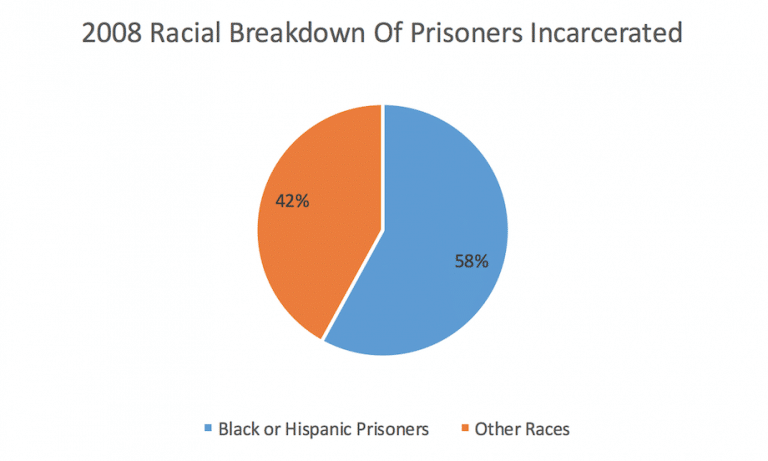The mayor of Denver, Michael B. Hancock, recently called for reforms to criminal justice policies that “have had disastrous effects on our communities of color” in the state of Colorado. The mayor writes that the state’s “drug laws and policies of incarceration” are “proving to be a failure,” and he advocated a number of sweeping reforms in a guest commentary published June 11 in the Denver Post.
Mayor Hancock writes, “the time is ripe for change in our criminal justice system,” and he insists that Colorado must alleviate prison overcrowding and what he calls “mass incarceration.” He’s right. From 1980 through 2008, the number of prisoners incarcerated in the United States rose from a half-million to 2.3 million, and in 2008, 58 percent of those prisoners were Hispanic or African-American. Currently, 36,000 people in Colorado are behind bars in the state’s jails and prisons, and a total of 123,000 are incarcerated or under criminal justice supervision.

HAS THE CRIMINAL JUSTICE SYSTEM CHANGED IN THE DENVER AREA?
However, according to the mayor, both Denver’s Sheriff’s Department and Police Department have recently implemented comprehensive policy changes and reforms. Jail is no longer the automatic response to the chronic mental health and substance-abuse challenges that face the Denver community. Courts and law enforcement now look to place individuals confronting such challenges in treatment programs rather than jails.
According to the mayor, under Chief Robert White, the Denver Police Department has become the singular model for criminal justice reform across the United States. The department has been part of an international effort to address the concerns of those individuals most affected by the legal system. While there is much more work to do, the mayor says that Denver’s citizens should be proud that our city is considered a leader in criminal justice reform.
In his guest commentary, Mayor Hancock also advocates a federal legislative proposal – the Sentencing Reform and Corrections Act of 2015 – currently under consideration by the United States Senate. If passed into law, the bill would reform the federal mandatory minimum sentencing laws that have led to overcrowded prisons and wasted tax dollars. The bill would fund additional treatment programs for inmates and allow federal resources to be used effectively to keep Colorado communities safe as some communities can be more dangerous than others. In addition to treatment programs there are scholarships specific to Colorado, local community support programs and public health support.
WHAT IS THE SENTENCING REFORM AND CORRECTIONS ACT OF 2015?
The Sentencing Reform and Corrections Act of 2015 is a chance for federal lawmakers to implement substantial criminal justice reforms at the federal level, a change that Colorado’s citizens have already supported at the state and local levels. Citizens are encouraged to contact their congressional representative as well as U.S. Senators Michael Bennet and Cory Gardner regarding the Sentencing Reform and Corrections Act of 2015. The mayor concludes his guest commentary by saying, “I urge Congress to pass this important piece of legislation.” If it becomes law, the Sentencing Reform and Corrections Act of 2015 would:
- Reduce the mandatory minimum life without parole sentence for a third drug offense under Title 21 of the United States Code, sections 841 and 851, to a mandatory minimum 25-year sentence.
- Reduce the mandatory minimum 20-year sentence for a second drug offense under Title 21 U.S.C. sections 841 and 851 to a mandatory minimum 15-year sentence.
- More narrowly define which prior drug offenses trigger longer mandatory minimum drug sentences under Title 21 U.S.C. sections 841 and 851.
- Apply the 15-year and 25-year mandatory minimum drug sentences to offenders who now have broadly-defined “serious violent felony” prior convictions.
- Make the Fair Sentencing Act of 2010 retroactive, allowing approximately 5,800 crack cocaine offenders sentenced before August 2010 to seek sentences in line with the Fair Sentencing Act’s reforms.
- Expand the “safety valve” exception so that in some cases nonviolent drug offenders can receive sentences below the mandatory minimum term.
- Create an additional safety valve exception for drug offenders facing 10-year mandatory minimum sentences so that they can receive the 5-year mandatory minimum prison term under certain conditions.
- Clarify that the 25-year mandatory minimum sentence for a second or subsequent offense of possessing guns in the course of drug trafficking offenses or crimes of violence under Title 18 U.S.C. section 924(c) only applies when the prior 924(c) conviction is final prior to the commission of the new 924(c) offense.
- Apply the 15-year mandatory minimum sentence for the second or subsequent section 924 offenses to offenders who have broadly-defined prior convictions for crimes that include gun possession, brandishing, or discharge.
- Allow some federal prisoners to earn time credits for completing rehabilitation programs and “cash in” those time credits at the end of their sentences for a transfer to a different type of supervision such as a halfway house.
- Create a new mandatory minimum sentence of 10 years for interstate domestic violence resulting in a death and five years for providing certain weapons or aid to terrorists.
- Create a new, mandatory sentencing enhancement to drug offenses under Title 21 U.S.C. sections 841 and 960. If the drugs in question include an analogue or any amount of the drug fentanyl, or if the drugs involved were represented as heroin, courts must add up to an additional 5 years in prison to an offender’s sentence.
WHERE ELSE IS THE JUSTICE SYSTEM BEING REFORMED?
Reforms to the criminal justice system are happening rapidly across the nation. In 2014, California’s Proposition 47 reclassified low-level property and drug felonies such as shoplifting, theft, and check fraud under $950, as well as personal illicit drug use, as misdemeanors. In New York City, thousands charged with low-level or non-violent crimes no longer have to post bail under a new plan to lower the number of inmates in the city’s crowded jail system.
Of course, if you commit a crime in the Denver area, you’ll still be arrested, and you’ll still need the counsel of an experienced Denver domestic violence attorney. Nevertheless, the United States is slowly, step-by-step creating a criminal justice system that is fair, that does not discriminate, and that genuinely delivers justice to citizens throughout Colorado and the other forty-nine states.







